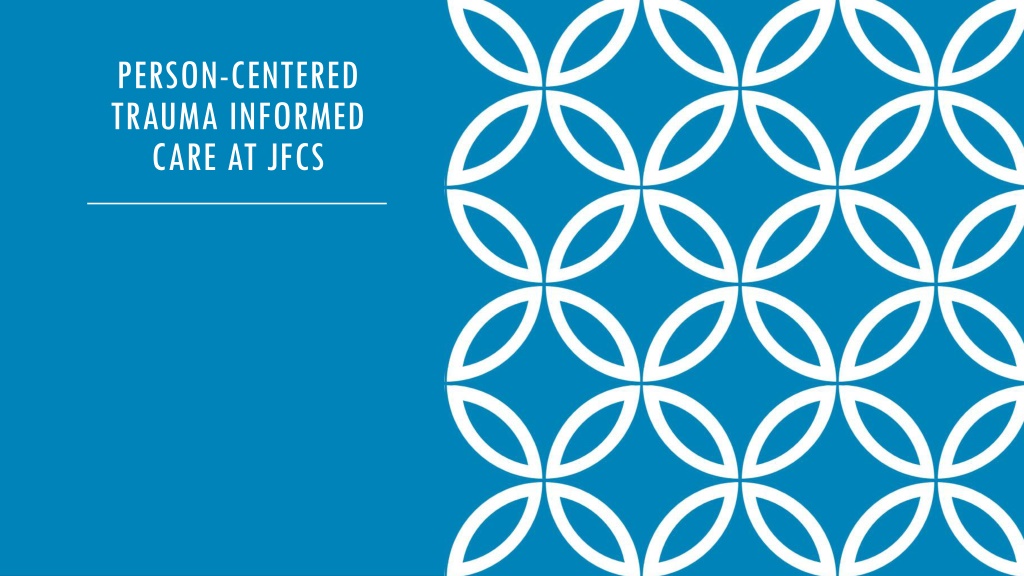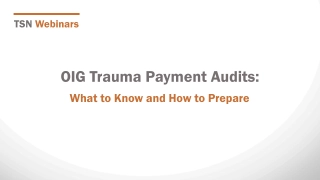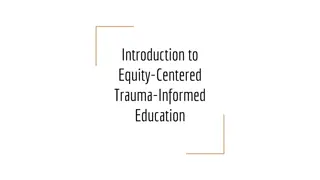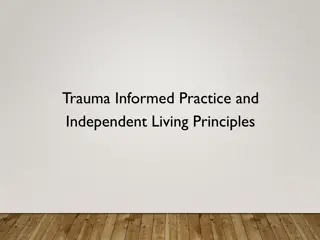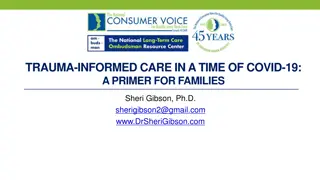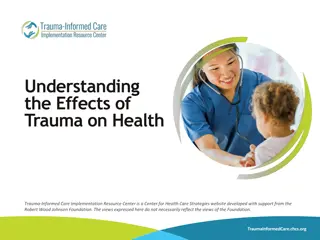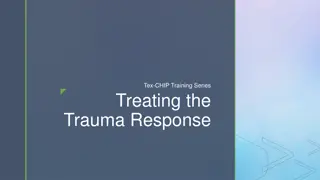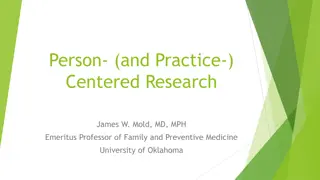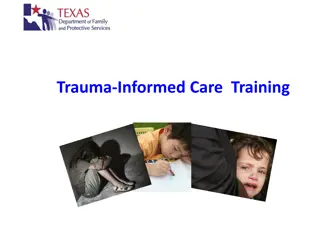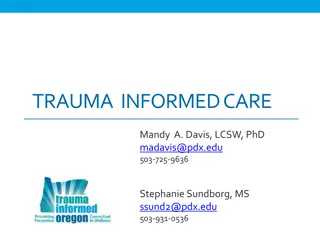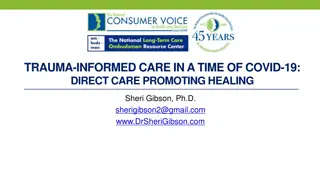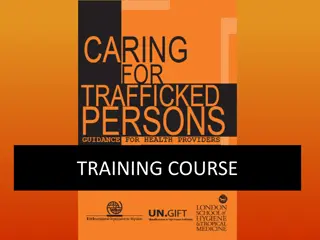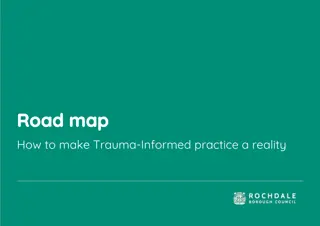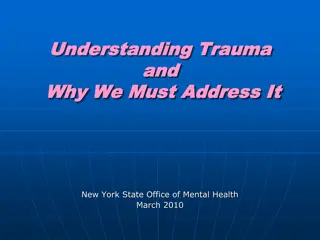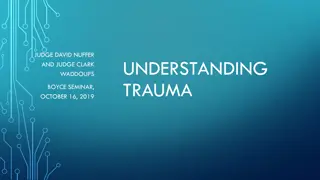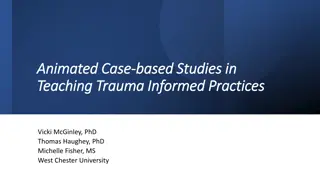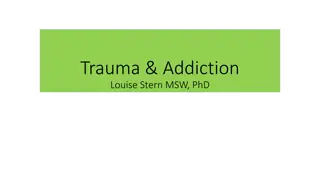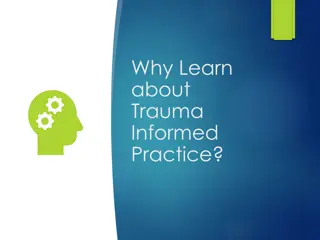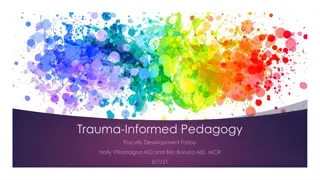Understanding Person-Centered Trauma-Informed Care at JFCS
Trauma-informed care at JFCS involves a commitment to sensitivity towards staff and clients who have experienced trauma. It recognizes the lasting effects of individual trauma on well-being and emphasizes principles like safety, trustworthiness, and empowerment. Understanding the impact of traumatic experiences on physical, cognitive, and emotional levels is essential, along with treating everyone with respect and humility.
Download Presentation

Please find below an Image/Link to download the presentation.
The content on the website is provided AS IS for your information and personal use only. It may not be sold, licensed, or shared on other websites without obtaining consent from the author. Download presentation by click this link. If you encounter any issues during the download, it is possible that the publisher has removed the file from their server.
E N D
Presentation Transcript
PERSON-CENTERED TRAUMA INFORMED CARE AT JFCS
WELCOME TO JFCS! That means we have a commitment to making sure the practices, policies, and culture here are sensitive to all staff and clients that may have experienced trauma in their lives. As an agency, we are committed to trauma- informed principles and service delivery.
WHAT IS TRAUMA? The Substance Abuse and Mental Health Services Administration (SAMHSA): Individual trauma results from an event, series of events, or set of circumstances that is experienced by an individual as physically and emotionally harmful or life-threatening and that has lasting adverse effects on the individual s functioning and mental, physical, social, emotional, or spiritual well-being. C. (2014, October 13). What s Your Concept of Trauma? Crisis Prevention Institute. https://www.crisisprevention.com/Blog/SAMHSA- Concept-of-Trauma#:%7E:text=The%20keywords%20in%20SAMHSA s%20concept,carrying%20the%20weight%20of%20trauma.
Events 3 E S IN TRAUMA Experience Effects
Fight TRAUMA RESPONSES Flight Freeze Fawn PSYCHOLOGY TODAY (2020, AUGUST22). UNDERSTANDING FIGHT, FLIGHT, FREEZE, AND FAWN RESPONSE. HTTPS://WWW.PSYCHOLOGYTODAY.COM/US/BLOG/ADD ICTION-AND-RECOVERY/202008/UNDERSTANDING- FIGHT-FLIGHT-FREEZE-AND-THE-FAWN-RESPONSE
NEAR Science *Neurobiology *Epigenetics *Adverse Childhood Experiences (ACEs) *Resilience THE SCIENCE OF TRAUMA TRAUMA INFORMED OREGON. (2021, JULY 13). TIO | MODULE 4: A BRIEF OVERVIEW OF NEAR SCIENCE. HTTPS://TRAUMAINFORMEDOREGON.ORG/TIC-INTRO-TRAINING-MODULES/MODULE-4/
Safety SIX KEY PRINCIPLES OF TRAUMA- INFORMED CARE Trustworthiness and Transparency Peer Support Collaboration and Mutuality Empowerment, Voice and Choice INFOGRAPHIC: 6 GUIDING PRINCIPLES TO A TRAUMA-INFORMED APPROACH | CDC. (2020, SEPTEMBER 17). CENTERS FOR DISEASE CONTROL AND PREVENTION. HTTPS://WWW.CDC.GOV/CPR/INFOGRAPHICS/6_PRI NCIPLES_TRAUMA_INFO.HTM Cultural, Historical and Gender Issues
Understanding that traumatic experiences impact the person on physical, cognitive, and emotional levels. Understanding that how we treat people and each other matters. Understanding that all behavior happens for a reason. Have Humility. Treat everyone with respect, sensitivity and patience; assume that anyone/everyone you have contact with client or coworker - can have a background involving trauma and triggers look different for everyone. WHAT HAPPENED TO YOU? NOT WHAT S WRONG WITH YOU?
a.There is a difference between operating through a PCTI lens and treating trauma. Trauma-informed care is different than trauma treatment and therapy. *REMINDER
VICARIOUS AND SECONDARY TRAUMA RESILIENCE AND SELF-CARE Our work can be challenging, but you are resilient. PCTI Care includes everyone; Associates have Adverse Childhood Experiences (ACEs) , too. Know what triggers you. Resources Reflective/Trauma-Informed Supervision Agency EAP SIT Committee
SENSITIVITY IN TRAUMA COMMITTEE The Sensitivity in Trauma (SIT) Committee 's vision is to acknowledge the rewarding, yet challenging work we do every day and be the voice of JFCS associates. Our mission is to cultivate and support the evolving process of ensuring a trauma-informed and culturally-sensitive workplace. SIT will work to identify best practices around self-care and trauma sensitivity; find creative and diverse ways to nurture relationships with our clients and each other; and be responsible for upholding effective self-care techniques in relation to our coworkers, our environment, and ourselves.
Lynette Ellis: lellis@jfcsphilly.org SIT MEMBERS Galia Godel: ggodel@jfcsphilly.org Hallie Goosenberg: hgoosenberg@jfcsphilly.org Julia Eidelman: jeidelman@jfcsphilly.org Melissa Blackson: mblackson@jfcsphilly.org Denise Crosby: dcrosby@jfcsphilly.org Stephanie Moats: smoats@jfcsphilly.org Sara Francesconi: sfrancesconi@jfcsphilly.org Carly Bruski: cbruski@jfcsphilly.org
SOURCES C. (2014, October 13). What s Your Concept of Trauma? Crisis Prevention Institute. https://www.crisisprevention.com/Blog/SAMHSA-Concept-of- Trauma#:%7E:text=The%20keywords%20in%20SAMHSA s%20concept,carrying%20the%20weight%20of %20trauma. Infographic: 6 Guiding Principles To A Trauma-Informed Approach | CDC. (2020, September 17). Centers for Disease Control and Prevention. https://www.cdc.gov/cpr/infographics/6_principles_trauma_info.htm Psychology Today (2020, August22). Understanding Fight, Flight, Freeze, and Fawn Response. https://www.psychologytoday.com/us/blog/addiction-and-recovery/202008/understanding-fight-flight-freeze- and-the-fawn-response Trauma Informed Oregon. (2021, July 13). TIO | Module 4: A Brief Overview of NEAR Science. https://traumainformedoregon.org/tic-intro-training-modules/module-4/
